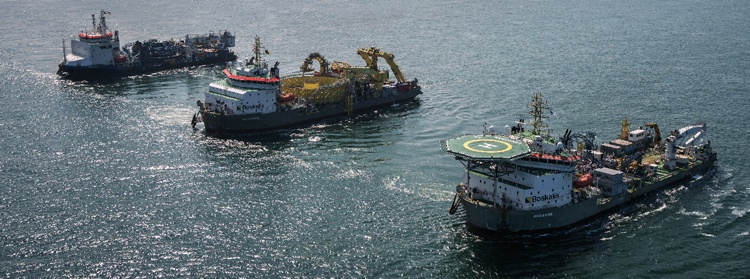
Boskalis is involved in the construction of various offshore wind farms throughout Europe and, in the future, far beyond that, as well is the expectation. The Boskalis business unit Subsea Cables & Flexibles – formerly VBMS – carries out the installation and repair of infield and export cables. These are challenging projects, often logistic puzzles and a complex interplay of vessels, equipment and maritime professionals. Achieving operational excellence in this developing market is not only a motivation for Boskalis, but also their greatest challenge.
The Ndurance, Ndeavor and Spirit. The three Cable Laying Vessels (CLVs) are the main assets in the offshore projects of Boskalis Subsea Cables & Flexibles. They have a turntable capacity from 2,000 to about 5,000 tonnes of cable and are built specifically to operate both offshore and nearshore. Manager Vessels & Crewing, Remco van Bochove, and his team are responsible for project crewing and the management, chartering and deployment of vessels. ‘And we’re not only talking about CLVs, but also the support vessels like Walk-to-Work (W2W), Anchor Handling Tugs (AHTs), Crew Transfer Vessels (CTVs), transport barges and accommodation vessels.’
Modular conversion
The Vessel Management department of Boskalis Subsea Cables & Flexibles deploys vessels from Boskalis’ Central Fleet Management Department Offshore for the various projects and in some cases from external parties. It is Vessel Management’s job to select the vessels, like the Spirit, best for project. ‘We, of course, prefer to choose for assets that are best suited for the job. However, sometimes multiple projects are running simultaneously, or a client requests a particular vessel because of its track record. In this case it may be necessary to modify a vessel’, explains Remco. ‘We always attempt to do this in a modular fashion so that we can complete the conversion quickly and efficiently. This is also because we don’t only take one specific project into account, but also future projects.’ Modifications are always the result of thorough consultation between Projects, Operations, Engineering, Vessel Management and Central Fleet Management. During a scheduled docking, Central Fleet Management can then carry out the adjustments directly. ‘Although our business unit does take care of the deck layout and engineering.’
Better and better
Improving, innovating, increasing safety and efficiency in how we work. The spearheads of the business unit’s improvement programme ‘We Connect’ hang on the wall in every office as a mantra throughout the organisation. ‘It’s in our DNA, but also it is an absolute necessity’, Remco clarifies. ‘The operation has a tremendous impact on our company. Operational excellence is a top priority. If we drop the ball on a project, we might not participate again next time. That is why we always hold a lessons learned meeting with everyone after a project. How can we do things more efficiently – faster and safer – tomorrow with the knowledge we have today and yesterday?’ Process improvement and innovation are on the agenda daily. This is partially also because the market is constantly developing, and no two projects are alike. For example, the boat landings of the wind turbines are different every time. ‘We are continuously modifying our assets accordingly. We also do this for safety reasons. With new Crew Transfer Vessels and Walk-to-Work Vessels, we put people right on top of the monopile. That saves the risk involved with stepping onto a ladder and intensive climbing.’
No outsiders
Preparing projects that will only begin in a few years is always a challenge. The market is still very much in the growth phase, and the legislation and regulations are maturing along with it. For example, what requirements will our people and equipment need to meet in 2021?’, Remco wonders. ‘Will we need other assets? There is a lot that you can prepare, but there is always a degree of uncertainty.’ An even bigger challenge perhaps is recruitment, deployment and retention of people with the right competences, qualifications and certification. ‘This changing market benefits from a stable organisation without too many changes and fluctuations. We are therefore committed to the retention of people. Whether it concerns our own people or hired crew.’ The magic word here is trust. We treat all people as our own. ‘We make sure that nobody feels like an outsider by treating the entire crew as equals. We expect commitment, enthusiasm and drive from everyone, so they can also expect that from Boskalis. That is why we are pleased with a partner like TOS, who shares the same philosophy. It creates a good synergy!’
